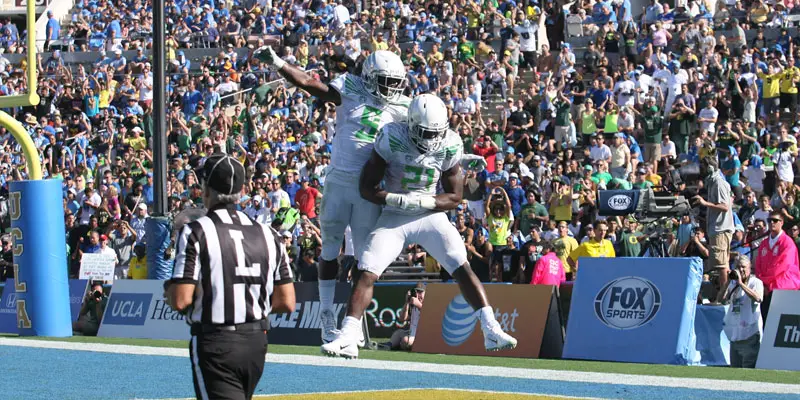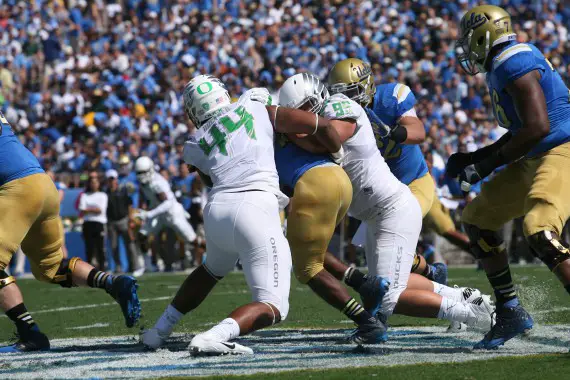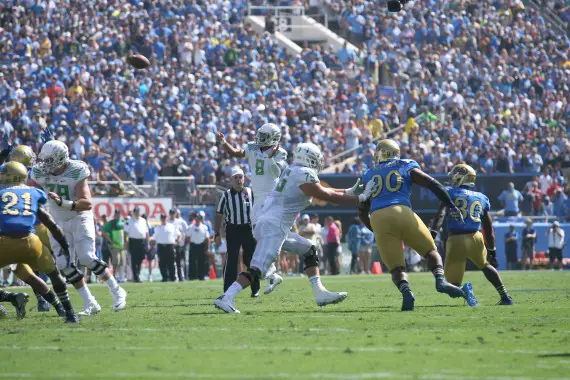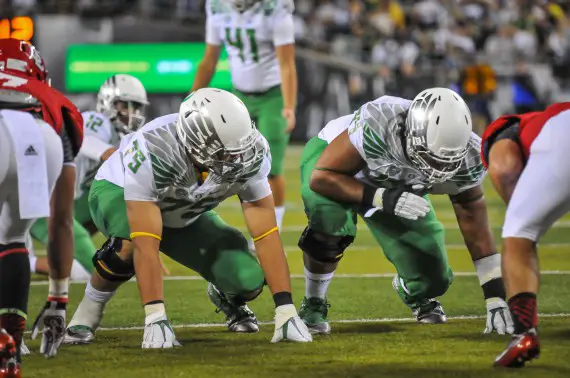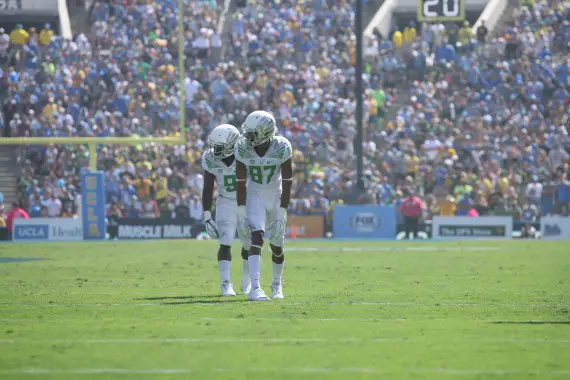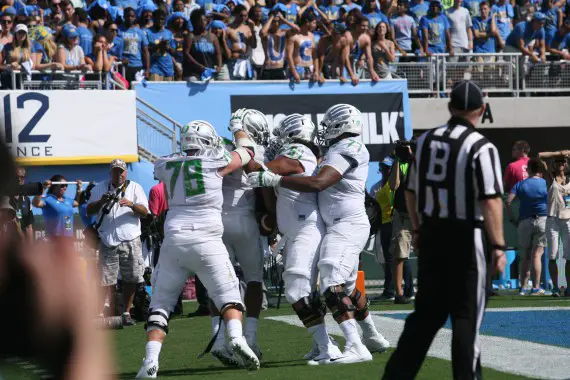Imagine if the 2007 season never ended.
That was the obvious connection following week six. Not just among the college football landscape because of tumult among the nation’s top teams, but within the dynamic of Oregon’s own team.
Just as in 2007, Oregon started the season looking like one of the best teams in the nation, jumping out to a 4-0 record, beating a school from the state of Michigan that was coming off a Rose Bowl the previous season. Eventually, injuries and a lack of depth at one of their best positions was Oregon’s undoing.
In 2014, just as in 2007, that lack of depth caught up with the second-ranked Ducks, as they could only muster 24 points in a Thursday night matchup against Arizona, giving the Wildcats their fifth win of the season. In 2007, that loss triggered a losing streak that saw the Ducks unable to win another regular season game that year, falling at UCLA the following week (the only time Oregon has been shut out in the past 29 seasons), followed by a loss in the regular season finale to Oregon State, ending a ten-game win streak by the home team in the rivalry.
In 2014 what did Oregon’s schedule look like following that Thursday night loss to Arizona? Just like 2007, a road game at UCLA, followed by home game against a rival (this time, Washington) with the pressure of another ten-game winning streak on the line.
This was not a good omen.
The 2007 season, one where the Ducks found themselves besieged by injuries, mercifully ended following that three game losing streak. In 2014, the Ducks were scheduled to play five more games following that ominous three-game stretch.
Now imagine the 2007 season never ended. Imagine Dennis Dixon came back (ignore the medical impossibility of that sentence) to end the year.
While no one would accuse Jake Fisher of being as electric of a player as Dixon was, he might be just as vital to Oregon’s championship chances this year as Dixon was in 2007. When it was announced that Fisher would start Saturday, fans knew Oregon had a chance. At the very least, this season would be different from 2007.
We can break down all the technical aspects of what has led to the offensive line’s struggles, but you only need to have worked in a professional management capacity to see why the offensive line was struggling.
Pretend you are a manager. Now imagine you have to leave on a business trip and need to leave people below you in charge of your department. In all likelihood, the assistant manager in your department will be familiar with many aspects of the job — having served in that role in limited circumstances before — and will have no problem stepping in. From there, everyone below moves up a notch, which most people can handle. When trouble occurs in any organization is when someone has to ascend at a rate faster than the individual is prepared for or capable of; you don’t want someone who was just hired suddenly running the department.
The offensive tackle equivalent of this played out for the Ducks during the Washington State and Arizona games. Everyone who was comfortable with the role of starting tackle was unavailable, and those filling in hadn’t had the experience to be making those decisions. This isn’t to disparage the efforts of Tyrell Crosby and Matt Pierson, who both have played admirably when pressed with responsibilities exceeding what would reasonably be expected of them.
Getting Fisher back was like getting the department manager back: even if everyone below him was pressed up a couple steps on the ladder, there is someone in the lead spot (in this case, left tackle) who pushes everyone else on the ladder to a level he is comfortable with. Not only is everyone back to his level of responsibility, but by having been pressed with an additional level of responsibility in recent weeks, the current level of responsibility feels infinitely more manageable than it did before.
This is why the Ducks gave up zero sacks on Saturday.
So does this mean everything is back to normal? Will the Ducks steamroll through the rest of the schedule and onto the playoff? Nope, but that doesn’t mean those things couldn’t happen either.
At the start of the season, I wrote that the way to approach this season was to “embrace the uncertainty.” Opinions on the Oregon program have been remarkably bipolar this season, anointing validation status on Mark Helfrich after starting the season undefeated and beating Michigan State, only to revoke that status following a loss to Arizona. Every time Helfrich loses, it draws Chip Kelly comparisons from fans, but what few understand is that the void from Kelly’s absence isn’t winning (both had identical 15-3 records after 18 games); it’s certainty.
Yet this is a year where certainty has no place. Pac-12 teams are 4-14 in conference games at home. ESPN predicted that there was a 47% chance the Pac-12 champion could have three losses. Uncertainty might feel like a problem localized to Oregon, but in 2014, it’s the state of college football. You know it’s a bizarre year when the number one team in the country is Mississippi State, who is doing its best 2007 Oregon impression itself. (Hyperathletic quarterback who had split time at the position the season before leading the Heisman voting? Check. String of consecutive wins over top ten teams including the defending conference champions? Check. Realistic national championship aspirations a season after the team went 7-6? Check.)
So why do I keep coming back to that 2007 season? Because of the similarities between that season and this one: the wild surrounding college football landscape, the signature wins for Oregon, the Ducks trying to overcome injuries to win a championship. But also it was the state of uncertainty surrounding the team that season. Oregon fans were devastated when the Ducks’ championship hopes ended with Dixon’s injury, because they were certain Oregon had missed its shot.
But what if, as mentioned before, that season didn’t end with Dixon’s injury? What if he had come back? Imagine there’s still all the uncertainty of the future possibilities of the team, just as there is today. Imagine if Dennis Dixon had returned to the lineup, and Oregon could still play for championship. How exciting would the end of the season have been? We may get a chance to find out this year.
Top image by David Pyles.
Related Articles:
Nathan Roholt is a senior writer and managing editor emeritus for FishDuck. Follow him on Twitter @nathanroholt. Send questions/feedback/hatemail to nroholtfd@gmail.com.

